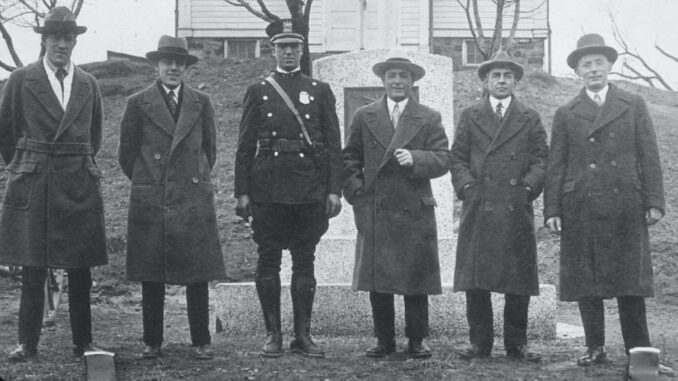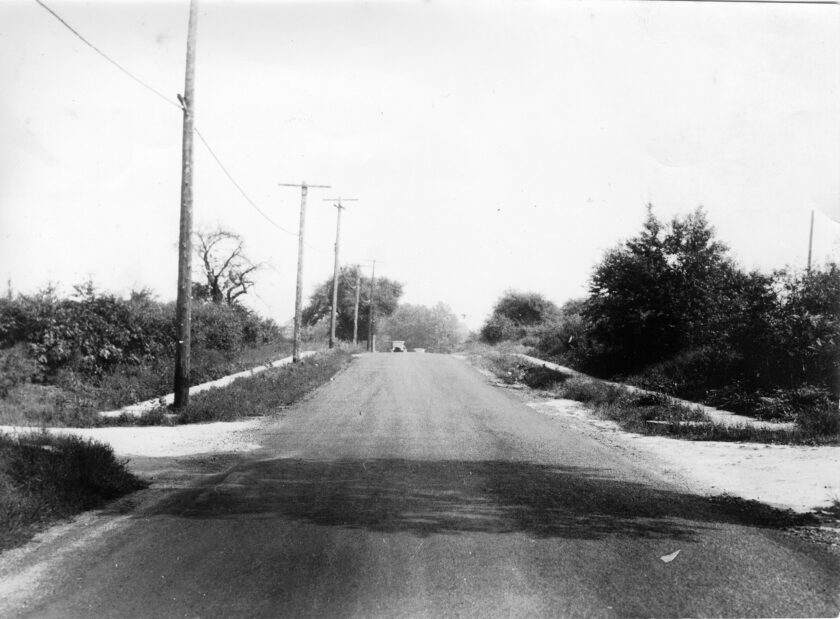
TOWNSHIP OF WASHINGTON—Off the beaten path from the Pascack Valley railroad line, the Township of Washington had stayed rural well into the 20th century. In the 1920s, the population was still only about 300 people. The landscape was made up of farmland, woods, and marshes. The Township of Washington was “the sticks” compared to neighboring Westwood, which had a busy downtown and nearly 5,000 residents.
In this week’s column, we go back 98 years to the first week of April 1926. Township of Washington officials were concerned about crime.
There seemed to be a rampant disregard for the laws of the road, with outsiders apparently viewing the rural township as primitive and lawless. There were no red lights to run in those days, but folks were speeding on the quiet country lanes and ignoring the few traffic signs that existed.
Even worse, as the Park Ridge Local newspaper wrote, at night the roads were “infested with parking petters”—that is, young couples in cars, engaged in unseemly activities. It didn’t help matters that the township had no street lights and was bathed in starry darkness after dusk.
The newspaper added, “The residents of Washington Township are an orderly and peace-keeping population, but outsiders seem to consider this a perfectly good place for unlawful parking and illegal speeding.”
The township’s law enforcement consisted of part-time constables John Ruddell and Benton Bloomer. These men had long held their positions with neither salaries nor uniforms. There was no patrol or 24/7 officers on duty; rather, the men used their own home telephones and responded to calls as needed.
Both of them had regular jobs: Ruddell lived on Ridgewood Road and ran a riding academy; Bloomer, of Pascack Road, was a plumber.
In April 1926 the town council took a few steps to bolster law enforcement. As the senior constable, it was time for Ruddell to look the part. The town budgeted $75 toward buying him a uniform and equipment. They also added a handful of special officers. Those men did not have uniforms, but were provided with badges. All of the policemen would serve without pay, “except that when on actual duty, they will receive a minimum wage of $2 a day,” the newspaper explained. That is equivalent to $35 today.

On the evening of April 9, 1926, Constable Bloomer had been called out to Pascack Road, near the Hillsdale border, for a case of “parking petters.” An automobile had been stopped on the side of the road for some time, and someone had heard a young lady inside the car yelling for help.
Bloomer found an 18-year-old male from Hackensack behind the wheel. His passenger was a 17-year-old girl from Teaneck. The driver did not have a license, just a permit. Questioned, the girl said that things had gotten out of hand, and she had wanted the boy to take her back home. Her companion had failed to respond as a gentleman should, so she had screamed for help.
The kids were taken to the home of the local justice, William Foster. By then it was midnight, and Foster was recovering from an illness, so he was already asleep. The gang drove to Westwood to see Justice E. Alan Meyer.
We surmise that Meyer was perturbed about this group showing up on his doorstep at that late hour, as he set a fine for the young man of $100. That was a hefty sum for the day, especially for an 18-year-old. It would register as approximately $1,700 in today’s money.
When the young man’s father got word of this, he made an arrangement for reopening the case on Monday. Exactly what was said between the men has been lost to time, but it must have been convincing. The $100 fine was thrown out; the young man’s driving permit was revoked instead.
Washington Township authorities were livid about the Westwood magistrate’s decision.
The Park Ridge Local reported, “Authorities claim that the sentence, though severe in the first place, should not have been changed, and no reopening should have been countenanced. [The township] considers the action of the magistrate an affront to the dignity of the municipality.
